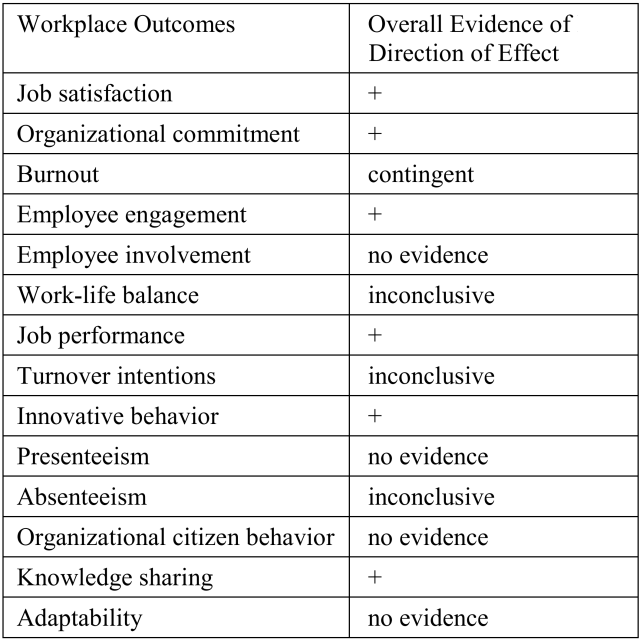
Is the use of social network sites in the workplace really a negative?
Many people use social network sites such as Facebook, Twitter, LinkedIn and Instagram in the workplace. However, this is typically seen as a negative, based on the assumption that social network site use is associated with undesirable outcomes such as poor job performance and absenteeism. In some workplaces, this view is so strong that social network site use can even lead to dismissal.
But are the negative assumptions about social network site use at work supported by the evidence? A recent paper1 sets out to answer this question through the conduct of a systematic literature review.
A keyword search of articles for the period January 2003 to August 2016 was conducted. The year 2003 was chosen as the earliest article date because some of the first examples of social networking sites—Friendster, MySpace, and LinkedIn—started in that year, followed by Facebook in 2004. The study was seeking both quantitative and qualitative evidence, so search terms were not used to restrict the results based on methodological consideration.
After the removal of duplicates, the initial search yielded 171 results. Exclusion criteria were then applied, substantially reducing the number of studies under consideration, and some additional studies were included from a review of the reference lists of the extracted papers. The final list of 27 articles was published between 2008 and 2015. Of the 27 articles, eight examined technology companies, one the banking industry, one the hospitality industry, two the services industry, and 15 were cross-sector. Different types of social network sites were considered in different papers, with the majority discussing social network sites in general, and six examining enterprise social network sites (ESNs).
Psychological and behavioural and outcomes assessment
The 27 studies were assessed for evidence of links between social network site use and a list of 14 psychological and behavioural workplace outcomes identified from relevant literature.
Psychological outcomes
- Job satisfaction. Employees’ affective reactions to their job experience, including pleasurable or positive emotional state resulting from the appraisal of one’s job or job experience.
- Organisational commitment. The relative strength of an individual’s identification, emotional attachment with and involvement in a particular organisation.
- Burnout. Employee’s prolonged response to chronic emotional and interpersonal stressors on the job, including exhaustion, cynicism, and inefficacy. Burnout might include dimensions such as emotional exhaustion, depersonalization and lack of personal commitment.
- Employee engagement. Harnessing of an employee’s self to his/her work role and is expressed physically, cognitively, or emotionally during role performances.
- Employee involvement. The exercise, by employees of influence over how their work is organized and carried out.
- Work-life balance. Degree to which an employee’s social life interferes with work or work interferes with social life.
Behavioural outcomes
- Job performance. Actions that are relevant to the goals of the organisation or self-reported work performance including productivity, quality, or effort in carrying out work.
- Turnover intentions. Employee’s intent, desire and plan to leave the organisation and including actively looking for another job.
- Innovative behaviour. Individual actions directed at the generation, introduction and/or application of beneficial novelty at any organisation, and it may include a new product, technology or change in procedures.
- Presenteeism. Situations where employees come to work but underperform such as producing lower quantity or quality of work, making mistakes, and repeating tasks and often engage in non-work-related activities such as personal business for a portion of the workday.
- Absenteeism. Any failure of an employee to report for or to remain at work as scheduled, it may be due to stress or medical illness.
- Organisational citizen behaviour. Employees’ voluntary commitment within an organization or company that is not part of his or her contractual tasks.
- Knowledge sharing and learning. Employees’ exchange of knowledge and experiences with colleagues or helping others to solve problems.
- Adaptability. Employees’ ability to cope with change in their work. Possible measures reflect that a respondent finds it easy to adjust to doing new tasks or finds it very encouraging when the work they do in their job changes.
Findings
The systematic review revealed that only 10 of the 14 outcomes had been the focus of the 27 articles, as shown in the following table.

Social network site use in the workplace appears to result in increased ‘positive’ work outcomes, as overall it was found to positively impact the psychological work outcomes of job satisfaction, organisational commitment, and employee engagement, and the behavioural work outcomes of job performance, innovative behaviour, and knowledge sharing.
However, evidence linking social network site use to work outcomes seen as ‘negative’, such as burnout, turnover intentions, absenteeism, and presenteeism, was inconclusive.
In conclusion, the researchers advise that:
It has been found that [social network site] usage can have positive and negative results depending on how it is used. If used mainly for positive work related tasks, the organisation stands to gain more from its usage. Organisations looking to improve knowledge sharing, job satisfaction and innovative behaviour outcomes, among others, might consider encouraging as opposed to inhibiting use of [social network sites] at work. The results show that [enterprise social networks (ESNs)] are highly associated with utilitarian usage, and to improve their adoption and usage in the workplace maybe hedonic usage such as social interaction may be incorporated in their design. Managers will need to consider how to achieve work-related use of public [social network site] platforms without regulating against their use entirely.
Header image source: Social Media apps by Jason Howie is licenced by CC BY 2.0.
Reference:
- Nkwe, N., & Cohen, J. (2017). Impact of Social Network Sites on Psychological and Behavioural Outcomes in the Work-Place: A Systematic Literature Review. Proceedings of the 25th European Conference on Information Systems (ECIS), Guimarães, Portugal, June 5-10, 2017, pp. 2051-2068. ↩
Also published on Medium.






